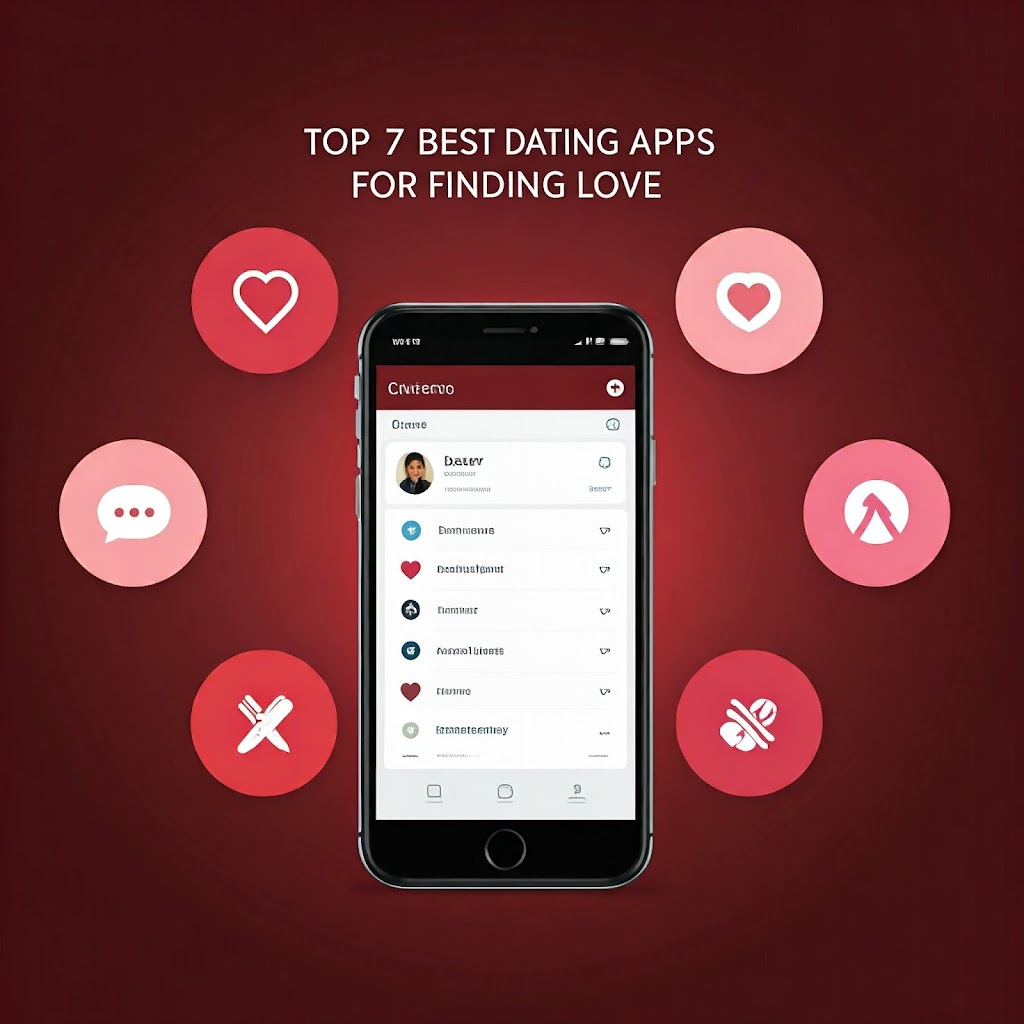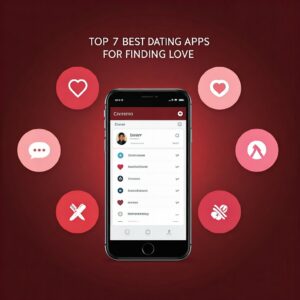In the digital age, where connections are made with a simple swipe, dating apps have transformed the way people meet and form relationships. The traditional methods of dating, such as meeting someone through friends or at social gatherings, have taken a back seat as more individuals turn to technology to find love. With countless options available, it can be overwhelming to navigate the dating app landscape. To help you in your quest for love, we’ve compiled a list of the “Top 7 Best Dating Apps” that cater to different relationship goals, preferences, and lifestyles.
1. Tinder: The Pioneer of Swipe Culture
Launched in 2012, Tinder is often credited with revolutionizing online dating. The app introduced the concept of “swiping,” allowing users to quickly browse through profiles and make decisions based on first impressions. With a user-friendly interface and an extensive global reach, Tinder has become the go-to app for many singles looking for casual relationships, hookups, or even something more serious.
Features of Tinder:
- Swipe Functionality: Users can swipe right to like a profile and left to pass, making the process fast and intuitive.
- Super Like: This feature allows you to show someone that you are particularly interested in them, increasing your chances of a match.
- Tinder Gold: A premium subscription that offers additional features, such as seeing who has liked you before you swipe.
Pros:
- Large User Base: Tinder has millions of active users, increasing your chances of finding a match.
- Quick and Easy to Use: The app’s design allows users to rapidly browse profiles.
- Location-Based Matching: You can find matches in your immediate vicinity, making it convenient for real-time connections.
Cons:
- Casual Dating Reputation: Tinder is often viewed as a platform for hookups rather than serious relationships, which may deter some users.
- Overwhelming Choices: The sheer volume of users can make it challenging to find meaningful connections.
2. Bumble: Where Women Make the First Move
Bumble was founded in 2014 by former Tinder executive Whitney Wolfe Herd, who aimed to create a dating platform that empowers women. In this app, women must initiate the conversation after a match, giving them control over their dating experience. Bumble has gained popularity for promoting respectful interactions and reducing instances of harassment.
Features of Bumble:
- Women-First Messaging: After matching, only women can send the first message, which must be done within 24 hours.
- Bumble BFF: This feature allows users to find friends, making it ideal for those new to a city.
- Bumble Bizz: A professional networking feature that enables users to connect for career opportunities.
Pros:
- Empowers Women: By allowing women to make the first move, Bumble fosters a sense of security and control.
- Multiple Modes: Users can choose between dating, friendship, or networking, making it a versatile app.
- Encourages Thoughtful Conversations: With a focus on meaningful interactions, users are more likely to engage in deeper discussions.
Cons:
- Time Limit: The 24-hour time limit for women to message can create pressure and lead to missed opportunities.
- Smaller User Base: While popular, Bumble has fewer users compared to Tinder, which may limit match options.
3. Hinge: Designed to Be Deleted
Hinge markets itself as the dating app “designed to be deleted,” emphasizing its goal of helping users find long-term relationships. Unlike other apps that encourage quick swiping, Hinge prompts users to create detailed profiles filled with personal anecdotes and preferences, fostering deeper connections.
Features of Hinge:
- Profile Prompts: Users answer questions that provide insight into their personalities, helping to spark conversations.
- Likes and Comments: Instead of just swiping, users can like specific parts of a profile, making it easier to start a conversation.
- Relationship Preferences: Users can specify their relationship goals, such as “looking for a relationship” or “just seeing what’s out there.”
Pros:
- Focus on Meaningful Connections: Hinge encourages thoughtful engagement, which can lead to more genuine relationships.
- Less Pressure: The app’s design allows users to take their time in getting to know potential matches.
- Compatibility Focus: The prompts and profile requirements help users identify shared values and interests.
Cons:
- Smaller User Base: Hinge may not have as many users as other dating apps, limiting the number of potential matches.
- Less Immediate Interaction: The app’s emphasis on conversation starters may slow down the initial dating process.
4. OkCupid: The App for the Inquisitive Heart
OkCupid is known for its in-depth compatibility matching system. The app uses a comprehensive questionnaire to assess users’ preferences, values, and interests, ultimately providing better match suggestions. This approach is ideal for those seeking serious relationships and individuals who want to learn more about their potential partners.
Features of OkCupid:
- Extensive Questionnaire: Users answer a variety of questions to help the app understand their personalities and match them with compatible partners.
- Detailed Profiles: Users can showcase their interests, lifestyles, and relationship goals.
- User-Generated Questions: Engage with potential matches on shared values and interests through questions that users can create and answer.
Pros:
- In-Depth Compatibility Matching: The app’s focus on personality traits and values helps users find more compatible matches.
- Diverse User Base: OkCupid attracts a wide range of users with various relationship goals.
- Encourages Meaningful Conversations: The extensive questionnaire fosters discussions based on shared interests and beliefs.
Cons:
- Time-Consuming Setup: Completing the profile and answering questions can take a significant amount of time.
- Inconsistent Engagement: Some users may not engage seriously with the app, leading to mismatches.
5. Match.com: The Classic Choice for Serious Daters
Match.com is one of the oldest dating platforms, established in 1995. It has a solid reputation for helping individuals find long-term relationships and even marriages. With a subscription-based model, Match.com attracts users who are serious about their search for love.
Features of Match.com:
- Comprehensive Profiles: Users create detailed profiles to attract compatible matches based on shared interests.
- Daily Match Suggestions: The app provides tailored match suggestions based on user preferences and activities.
- In-Depth Search Filters: Users can narrow down potential matches based on specific criteria, such as age, location, and interests.
Pros:
- Established Reputation: Match.com is known for facilitating serious relationships, making it a trusted platform.
- Focus on Compatibility: The app encourages users to provide detailed information to enhance match suggestions.
- Active User Base of Serious Daters: Many users are looking for long-term connections, increasing the chances of finding a compatible partner.
Cons:
- Subscription Fees: The cost of a subscription may deter casual users or those on a budget.
- Less Modern Interface: Some users may find the platform less appealing compared to newer apps.
6. eHarmony: The Science of Love
eHarmony is renowned for its scientific approach to matchmaking. The platform uses a comprehensive personality test to match users based on compatibility. This method has proven effective, with many users finding lasting relationships through the app.
Features of eHarmony:
- Compatibility Quiz: A thorough questionnaire assesses personality traits, relationship preferences, and values.
- Detailed Match Suggestions: Users receive matches based on extensive compatibility analysis rather than superficial traits.
- Guided Communication: The app provides conversation starters to facilitate meaningful discussions between matches.
Pros:
- Scientific Matching Process: eHarmony’s approach is backed by research, increasing the likelihood of finding a compatible partner.
- Focus on Long-Term Relationships: The platform is designed for users seeking serious commitments.
- Active Community of Serious Singles: Many users are genuinely interested in finding lasting relationships.
Cons:
- Time-Consuming Registration: The extensive registration process can be off-putting for some users.
- Subscription Fees: Like Match.com, eHarmony requires a subscription, which may deter casual users.
7. Coffee Meets Bagel: Quality Over Quantity
Coffee Meets Bagel takes a unique approach to online dating by prioritizing quality over quantity. Instead of overwhelming users with endless options, the app curates a limited number of matches each day based on user preferences. This encourages users to take their time in getting to know potential partners.
Features of Coffee Meets Bagel:
- Curated Matches: Users receive a select number of matches each day, allowing for more focused interactions.
- In-Depth Profiles: Users share their interests, values, and preferences, promoting meaningful connections.
- Icebreakers: Pre-written prompts help initiate conversations and break the ice.
Pros:
- Reduces Overwhelm: The limited daily matches prevent users from feeling overwhelmed by choices.
- Encourages Thoughtful Interactions: Users are more likely to engage in meaningful conversations.
- Focus on Quality Connections: The app’s design promotes deeper connections rather than superficial encounters.
Cons:
- Limited Matches: Some users may find the limited number of daily matches frustrating.
- Slower Pace: The app’s emphasis on quality may not appeal to those looking for immediate connections.
Conclusion
Navigating the world of online dating can be both exciting and daunting. The “Top 7 Best Dating Apps” outlined in this article offer a range of features and experiences, catering to different relationship goals and preferences. Whether you’re seeking a casual fling or a serious commitment, there’s an app tailored to your needs.
As you embark on your journey to find love, remember to prioritize safety, be authentic, and maintain an open mind. The right dating app can connect you with potential partners who share your interests and values, but it’s essential to engage genuinely and take your time. With patience and the right approach, you may just discover the love you’ve been searching for in this digital age. Happy dating!
FAQ
Q1: Are dating apps safe to use?
A1: Most dating apps have various safety features, but it’s essential to practice caution. Always meet in public places and inform a trusted friend about your plans.
Q2: What should I include in my dating profile?
A2: Include high-quality photos, a bio that reflects your personality, and answers to prompts that spark conversation. Honesty is key!
Q3: Can I find a serious relationship on dating apps?
A3: Yes, many dating apps cater to individuals looking for serious relationships. Apps like eHarmony and Match.com are particularly focused on long-term connections.
Q4: How do I start a conversation on a dating app?
A4: Use unique icebreakers related to something in their profile or answer prompts they’ve shared. Avoid generic openers to stand out.
Q5: How do I choose the right dating app for me?
A5: Consider your relationship goals, preferred interaction style, and the user demographic of the app. Trying out a few different apps can help you find the best fit.
Q6: What if I don’t get matches?
A6: Adjust your profile, update your photos, and be active in liking and messaging others. Sometimes, a simple refresh can improve your chances!
Q7: How can I make my profile stand out?
A7: Use high-quality images, be authentic in your bio, and engage with prompts to show your personality. Adding humor or unique interests can also attract attention.
This article provides a comprehensive overview of the top dating apps available today, ensuring you have the necessary information to make informed decisions in your search for love. Happy dating!


